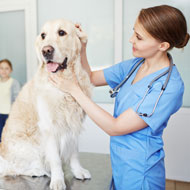Female vets ‘still facing discrimination’ - survey

BVA president Simon Doherty said it is "unacceptable" that when everything about two vets is equal, their gender can have a significant impact on how they are perceived, treated and paid.
A new study suggests that women in the veterinary profession are still facing discrimination and the most likely culprits are those who believe it is no longer an issue.
Scientists at the University of Exeter, working alongside the BVA, surveyed around 260 UK-based employers, partners and managers to find out if they showed any bias when reviewing male and female work records.
Participants in the study were asked to review a vet’s performance evaluation. All were shown the same evaluation but half were randomly assigned a version in which the vet’s name was ‘Mark’ while the rest reviewed ‘Elizabeth’.
In total, 44 per cent of participants said they felt female vets no longer experience discrimination. Of these, 66 per cent were male. Those who held this belief said they would pay ‘Mark’ a significantly higher salary, ranging from £1,100 to £3,300 more than Elizabeth.
This set of participants also perceived Mark as significantly more competent than Elizabeth. Furthermore, managers and employers who perceived a member of staff as more competent would be more likely to let them take on more managerial responsibilities; encourage them to pursue promotions and advise other vets to look to them as a valuable source of knowledge.
By contrast, the 42 per cent of participants who believed that female vets still experience gender discrimination showed little to no difference in how they treated or perceived Mark and Elizabeth.
Commenting on the findings, BVA president Simon Doherty said it is “unacceptable that in 2018, when everything about two vets is equal, their gender can still have a significant impact on how they are perceived, treated and paid.”
Lead author Dr Chris Begeny said: “…our results clearly demonstrate that discrimination is still a problem, negatively impacting the careers of women in this profession.
“But not everyone is necessarily contributing to this inequality. Instead it seems there may be a subset of individuals—substantial in size, but a subset no less—who may need to take a little extra time at work to consider whether their own bias is affecting their judgement on which of their employees or colleagues are truly most competent and capable.”
BVA said it will undertake further research with Exeter to shed light on how these beliefs and inequalities can be tackled.



 The Veterinary Medicines Directorate (VMD) is inviting applications from veterinary students to attend a one-week extramural studies (EMS) placement in July 2026.
The Veterinary Medicines Directorate (VMD) is inviting applications from veterinary students to attend a one-week extramural studies (EMS) placement in July 2026.